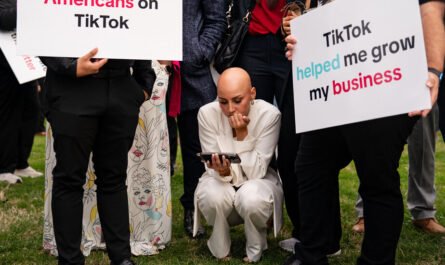As the sheen on dating apps dulls, more Americans are reporting bad experiences on them. Frustrated by bots, subscription costs and high effort-to-reward ratios, Gen Z is fleeing the apps in hope of real-life meet-cutes. Earlier this year, “Bustle” declared that dating apps are in their “flop era.”
Not all of the apps are taking this backlash without a fight. On Tuesday, after months of internal shake-ups and stock market woes, Bumble took a shot at winning back hearts and minds with a redesign, which includes a break with the app’s requirement that women make the first move.
A new feature, which the company has called “Opening Moves,” allows women to place on their profiles a question, like “What is your dream vacation?,” to which men who match can respond. (In nonbinary and same-gender matches, both sides can include these prompts.)
The shift is a major one for Bumble. Until now, a man who matched with a woman on the app had to wait for her to message him. If she did not initiate a conversation, the match would expire after 24 hours.
Whitney Wolfe Herd founded Bumble in 2014 because of her own personal experiences. She said that the idea was to give women more control. “I had a series of bad relationships, and I felt I was controlled by a man,” she added, “whether it was: Don’t wear this or, You can’t hang out with this person or, You need to be home at this time.”
But over the years, Bumble received feedback from women who found that making the first move was “a lot of work” or “a burden,” and Ms. Wolfe Herd began thinking about how to release the pressure. Opening Moves, she said, is a result of that process, a way to let women maintain control while not feeling the stress of initiating all of the conversations.
Since Bumble’s initial public offering in 2021, the company’s stock price has dropped 86 percent. Bumble isn’t alone in this decline; Match Group’s stock price has also suffered in the same time period.
“There are currently so many dating apps,” Kathryn D. Coduto, an assistant professor of media science at Boston University, said. The feeling, she said, among people with whom she has spoken in her research is: “Which of these apps can fulfill what users are looking for? Maybe none of them.”
Ms. Jones countered that millions of people around the world continue to rely on dating apps. In 2023, Bumble had 42 million active monthly users across its brands.
Half of U.S. adults under 30 have tried out a dating app or website, according to Pew — but those users are rarely impressed by what they find. An Axios/Generation Lab survey of nearly 1,000 college and graduate students found that most of the respondents rarely opened their dating apps.
In recent years, competitors have also been turning up the heat on mainstream players like Bumble. A crop of new apps use machine learning to help people start and continue conversations with potential dates. At least one dating app goes even further, promising to conduct initial conversations on behalf of its users, via chatbots.
Bumble and Tinder have also used machine learning for years, particularly in their matching algorithms. And, along with Opening Moves, Bumble is introducing other features this week that will inform its algorithm. Users can now add two “Dating Intentions,” like “intimacy, without commitment” and “ethical nonmonogamy” to their profiles. They can also input character traits that they prioritize, such as “loyalty” or “sarcasm,” and add causes that they support, like Black Lives Matter or feminism, to help the app find potential matches.
Ms. Wolfe Herd said that she envisioned a tool in which A.I. functions as something of a personal assistant. “Your A.I. bot goes out, interfaces with thousands of profiles, comes back with 30 that it thinks are right for you,” she said. Then, she added, the bot could hold basic conversations on your behalf and could filter out responses that are rude or not aligned with your values.
In contrast, however, some online dating companies are fighting app fatigue by trying to get people off their phones, through dinners with strangers, connections forged over favorite local spots, and chaotic singles parties where guests bring a match from Tinder as a plus one.
“People are craving the sense of a spontaneous connection,” Ms. Wolfe Herd said. But, she doesn’t see this desire as the end of dating apps, she said: “The reality is, technology is just too good, and it’s too convenient, and it’s too helpful.”



